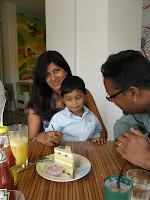A scene keeps flashing before me
Children aged 5, 6, 7, 10
Chasing, running, playing
My earliest memory of,
Cousins!
We had turkey that Christmas
Something new to most of us
A big flappy black bird
That we shooed around the garden
Just the day before
Don't remember conversations
Just the camaraderie
The ease in which children intermingle
Like a petal storm
Moving together in twists and turns and flips
But always in harmony
Because of an unseen force that fuses them together
The neighbours join in the frolic
Wild and free like the wind
Going anywhere our legs would take us
In the garden
On the road
Accross the barren field facing our house
The women were in the kitchen
Every Christmas the same faces
Laughing eyes
Golden smiles
Chatting, chopping, cooking, washing, cleaning and putting away.
They did everything from scratch
But lunch was served on time
We'd eat in turns - children first
Seated around the oval table
Afterwards we'd sit around with bowls of ice-cream
And Apapa would tell us stories
Once Amama (who was bed ridden) came out and played the piano
While we sang carols
Remember the hair dye we made for Uncle Henry?
And whose idea it was?
We had to give up our rooms
Sleep on the cushions
That we arranged in neat rows on the floor
Spread over with bedsheets
Those banished to the room
would sneak out
To reunite with their cousins
once the adults were asleep
Whispering in the dark,
pillow fight in the morning.
As we grew older
We stopped playing outside
But would still segregate ourselves from the adults
To partake of each other
A catch up session
Laced with easy banter, teasing, pulling legs
We just sat around and talked
Yet derived so much pleasure
A bond was forged
Time passed
After awhile
We did not anymore
play together
Or converse like before
Or congregate in that full force
The bond remained
But the unthinkable happened: We ignored the cracks
And we just never learnt to take care of each other
beyond playing host
We grew older, and grew closer
But then we grew apart
Not in heart or mind, but physically
The result: A broken link
That has broken our hearts
And burned our eyes
And torn our spirits
Full of remorse, regret
Tossing, turning, weeping
Who can sleep?
Knowing that
We did not take care of each other
May 30, 2008
December Daily® 2023 | Paint + Play with Jill
2 years ago















